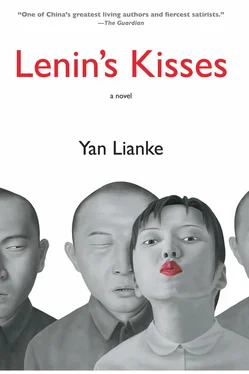Deputy Chief Liu continued, “There would also be food and housing expenses, as well as tourist items and local specialties. I’d even be concerned that the streets would be too narrow, leading to traffic jams, and that there might be too few hotels and guest houses, leaving visitors with not enough sites to visit and spend their money.”
Deputy Chief Liu discussed this plan with Secretary Niu in the county guest house, and as Secretary Niu listened he idly picked at a cigarette hole in the arm of the sofa where he was sitting, until the pea-sized hole gradually grew to the size of a date, a walnut, and finally a persimmon. Secretary Niu was nearing sixty, dressed in plain clothes, and had a tall and slender build. What little hair he had left had all gone gray. He had toiled on behalf of the Revolution his entire life, and had met countless officials and cadres. In fact, Liu Yingque was himself someone Secretary Niu had promoted from the ranks of township cadres.
When Secretary Niu had first arrived in the county several years earlier, he had heard that there was a township with a paved road, where every house had electricity and running water, and each kitchen had a faucet that, if left open, could flood the entire house. Secretary Niu asked where the money for the running water came from, and was told that someone had paid for it. He asked who this was, and was told that before Liberation someone from the township had moved to Southeast Asia and opened a bank. One day, the banker decided to return to his hometown for a visit, and when he did Liu Yingque, who at the time was the township chief, forbade the peasants from working in the fields that day, despite the fact that this was harvest season, and gave all the local children the day off from school.
As a result, everyone, young and old alike, lined up along the road to greet the visitor. There was a fifty-seven- li -long dirt road from the township center to the visitor’s village, and most of the road was so muddy that cars and trucks couldn’t use it. When the visitor left the township center, he found that both sides of the entire length of the road were lined with peasants. The road was covered in red, though this was not a conventional red carpet but rather a patchwork of red cloth, red paper, and the red silk that the villagers ordinarily used only for weddings. Each village had been assigned a different stretch of road, and the villagers who didn’t have any red silk or cloth instead used women’s red shirts and jackets. It was raining that day, and when the visitor got out of the car that had brought him to that point, he was immediately met by a red silk wedding sedan-chair. Upon seeing this endless stretch of red road, the visitor initially refused to climb into the sedan, whereupon the sedan carriers knelt down before him, leaving him no choice but to climb in.
After the visitor finally mounted the sedan, the carriers began making their way along the fifty-seven- li -long red-carpeted road to Liven.
The peasants lining the road were beating their drums, blowing their horns, and rhythmically clapping their hands.
The visitor would periodically try to get down from the sedan to walk on his own, but each time he did so the carriers would immediately kneel down before him. Even if he still tried to proceed astep, 9he didn’t dare tread on the red cloth, red silk, and red brocade. The peasants lining the road immediately stopped clapping their hands, beating their drums, and blowing their horns, and everyone — young or old — also knelt down before him. They said he brought glory to his homeland, and that if he refused to ride in the sedan-chair along the red-carpeted path, it would suggest he didn’t appreciate the welcome they had prepared for him. He therefore had no choice but to return to the sedan. When he finally arrived at the village, he tearfully knelt down before the village elders and promised he would pay whatever it took to pave that fifty-seven- li -long road, and would supply the entire township with water and electricity.
Afterward, Secretary Niu had gone down to the township to take a look, and met with the township chief, Liu Yingque.
Secretary Niu asked him, “Would you be able to provide all of the villages in the county with electricity and running water?”
Liu replied, “I am the township chief, and am only responsible for this single township. How could I be responsible for an entire county?”
Shortly afterward, Liu Yingque was promoted to deputy county chief, whereupon he did indeed become responsible for all of the villages in the county. Secretary Niu knew that Liu had fixed up the road to the village quite nicely, permitting cars to drive along it as smoothly as ships on the sea.
Now, looking at this person, this official, this Chief Liu, Secretary Niu recognized that he was a wise official, and that he was full of astonishing wisdom. Nevertheless, when Liu raised the idea of buying Lenin’s corpse and displaying it on Spirit Mountain, Secretary Niu jumped in alarm as if he had just seen someone shatter a stone with a touch of his bare foot or the mere sound of his voice. At first he looked scornfully at this short and burly deputy county chief, as though he were fashioning a statue out of mud softened with his own piss. When he heard Liu calculate the projected revenue from selling admission tickets, however, his look of disdain was gradually replaced by a slight smile. When Liu paused, Secretary Niu stopped picking at the cigarette hole in the sofa’s armrest and looked sternly at Liu Yingque, the way a father might regard a son wearing tattered clothes and covered in piss-mud, uncertain whether to hug or hit him.
Secretary Niu pondered for a while, then lowered his voice and asked, “Do you know what Lenin’s original name was?”
Deputy Chief Liu looked down at his feet, then laughed. “Yes, of course. How could I not know his name? While looking over my documents, I repeated his name several times to memorize it. It is thirteen Chinese characters long: Fuo-la-sai-mi-er Yi-li-qi Wu-li-yang-nuo-fu : Vladimir Ilyich Ulyanov.” He added, “Lenin was born in the fourth lunar month of the gengwu Year of the Horse from two sixty-year jiazi cycles ago, and he died in the twelfth month of the thirteenth year of the Chinese Republic.” Liu specified, “Lenin died three months short of his fifty-fourth birthday, meaning that he fell more than ten years short of our current life expectancy.”
“Do you know what books he wrote?”
“His most famous works are What Is to be Done?; Materialism and Emperio-Criticism; Imperialism, the Highest Stage of Capitalism ; and The State and Revolution . Lenin was the progenitor of our country’s socialist system, and the father of our socialist state. What child wouldn’t be aware of his father’s circumstances?”
“But why would the Russians be willing to sell us his corpse?”
At this point, Deputy Chief Liu took a document pouch out his bag, from which he removed a copy of Reference News, together with a pair of internal documents available only to county-level cadres and above. It was an old issue of Reference News, from the gengwu Year of the Horse, 1990, and in the lower right corner of the second page there was a three-hundred-and-one-character-long article entitled “Russia Wishes to Cremate Lenin’s Remains,” describing how a critical question confronting all of Russia’s political parties following the breakup of the Soviet Union was whether to preserve or to cremate Lenin’s embalmed corpse, currently on display in Moscow’s Red Square, and concluding that those opting for cremation seemed to be gaining the upper hand.
One of the two internal documents was written three years and the other six and a half years after the Reference News article, with the latter of the two documents having been published just three months prior to the present meeting between Niu and Liu. Both of the documents focused on instances in which peasants committed suicide or disrupted county government to protest excessive taxation, or banded together to destroy county government gates, furniture, and vehicles in order to protest perceived injustices. They also described a case in which officials from one southern township went to a village to collect taxes, whereupon a woman who couldn’t pay climbed into bed with one of the tax collectors in order to receive an exemption. From that point on, all of the village women unable to pay their taxes attempted to sleep with government officials, and deeply resented those who declined their advances.
Читать дальше












